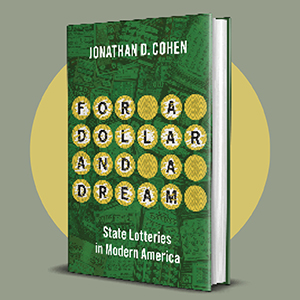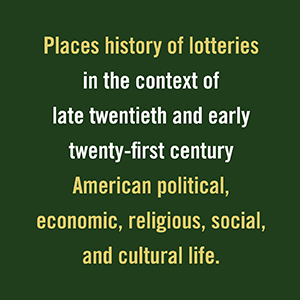Every week, one in eight Americans places a bet on the dream of a life-changing lottery jackpot. Americans spend more on lottery tickets annually than on video streaming services, concert tickets, books, and movie tickets combined. The story of lotteries in the United States may seem straightforward: tickets are bought predominately by poor people driven by the wishful belief that they will overcome infinitesimal odds and secure lives of luxury. The reality is more complicated. For a Dollar and a Dream shows how, in an era of surging inequality and stagnant upward mobility, millions of Americans turned to the lottery as their only chance at achieving the American Dream.
 In his new book, For a Dollar and a Dream: State Lotteries in Modern America, Jonathan D. Cohen presents comprehensive study of the American lottery industry. Gamblers, he notes, were not the only ones who bet on betting. As voters revolted against higher taxes in the late twentieth century, states saw legalized gambling as a panacea, a way of generating a new source of revenue without cutting public services or raising taxes. Even as evidence emerged that lotteries only provided a small percentage of state revenue, states kept passing them, desperate for their longshot gamble to pay off.
In his new book, For a Dollar and a Dream: State Lotteries in Modern America, Jonathan D. Cohen presents comprehensive study of the American lottery industry. Gamblers, he notes, were not the only ones who bet on betting. As voters revolted against higher taxes in the late twentieth century, states saw legalized gambling as a panacea, a way of generating a new source of revenue without cutting public services or raising taxes. Even as evidence emerged that lotteries only provided a small percentage of state revenue, states kept passing them, desperate for their longshot gamble to pay off.
Alongside stories of lottery winners and losers, For a Dollar and a Dream shows how gamblers have used prayer to help them win a jackpot, how states tried to pay for schools with scratch-off tickets, and how lottery advertising has targeted lower income and nonwhite communities.
 Cohen takes all of these pieces and puts the history of lotteries in the context of late twentieth and early twenty-first century American political, economic, religious, social, and cultural life. Using archives from seventeen states, presents never-before-told elements of lottery history, including the inner-workings of lottery commissions, true stories about lottery winners, and the operations of lottery companies bent on increasing ticket sales no matter the cost. If you’re interested in learning more, click here to grab a copy of the book.
Cohen takes all of these pieces and puts the history of lotteries in the context of late twentieth and early twenty-first century American political, economic, religious, social, and cultural life. Using archives from seventeen states, presents never-before-told elements of lottery history, including the inner-workings of lottery commissions, true stories about lottery winners, and the operations of lottery companies bent on increasing ticket sales no matter the cost. If you’re interested in learning more, click here to grab a copy of the book.




Leave a Comment
Share